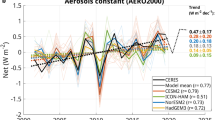Abstract
IN a recent paper Ertell has shown, at some length, that turbulent motion in the atmosphere reduces the pressure, recorded by a barometer, by ρw′2 dynes/cm.2, where is the density of the air arid w′ is the vertical component of the turbulent velocity. This, result we can get quite simply from analogy with the kinetic theory of gases, as pointed out by McCrea.2 Ertel estimates that a mean wind-speed near the ground of 10 m./sec. would lower the local pressure by 0.08 mb.; a calculation from the observations of Scrase3 gives results of the same order.
This is a preview of subscription content, access via your institution
Access options
Subscribe to this journal
Receive 51 print issues and online access
$199.00 per year
only $3.90 per issue
Buy this article
- Purchase on Springer Link
- Instant access to full article PDF
Prices may be subject to local taxes which are calculated during checkout
Similar content being viewed by others
References
Met. Zeit., 47, p. 22; 1930.
M.N.R.A.S., 89, p. 721; 1929.
M.O. Geophysical Memoirs, No. 52.
NATURE, 115, 263; 1925.
Phil. Trans. Roy. Soc., A, 223, p. 289; 1922.
Author information
Authors and Affiliations
Rights and permissions
About this article
Cite this article
ROBERTS, O. Some Effects of Turbulent Pressure. Nature 129, 23–24 (1932). https://doi.org/10.1038/129023b0
Issue Date:
DOI: https://doi.org/10.1038/129023b0
Comments
By submitting a comment you agree to abide by our Terms and Community Guidelines. If you find something abusive or that does not comply with our terms or guidelines please flag it as inappropriate.



